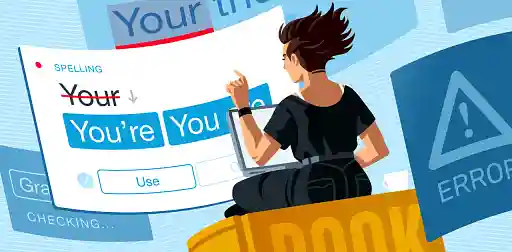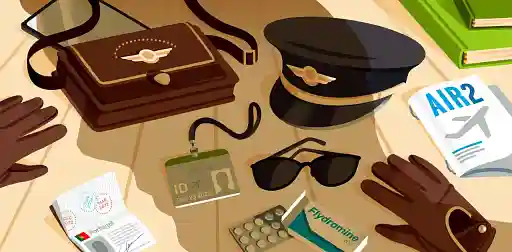Last updated on Oct 15, 2025
Writer's Block: How to Overcome Writing Constipation
Martin Cavannagh
Head of Content at Reedsy, Martin has spent over eight years helping writers turn their ambitions into reality. As a voice in the indie publishing space, he has written for a number of outlets and spoken at conferences, including the 2024 Writers Summit at the London Book Fair.
View profile →Writer's block can hit at any point in a writer's career. Though he might deny it, the fact that George R.R. Martin has been writing the next installment of his Song of Ice and Fire saga for over 13 years suggests that even the most successful and prolific writers are not immune to authorial constipation.
In this guide, we'll examine the possible causes of writer's block and share some of our favorite remedies for this most dreaded of creative curses. Let’s start by understanding what writer’s block really is and what causes it.
What is writer's block?
Writer's block is a common phenomenon where writers experience difficulty in coming up with ideas or generating new material, causing them to stagnate while drafting their works. It is defined as a psychological inability to start or continue writing for reasons other than a lack of skill or commitment, according to the University of Illinois Springfield.
Writer’s block is sometimes lumped together with procrastination, and while there’s definitely some overlap between the two, like a tendency to avoid the task and a fear of failure, the difference between the two is that when you’re procrastinating, you usually have an idea of what you should be doing, but are for some reason putting it off. Writer’s block, on the other hand, stems from feeling like you literally can’t think of what to write and all your ideas have run dry.
Simply put, writer’s block is when you can’t write even though you want to. Many writers try to push through it and hope it goes away on its own. While this often works, the specific cause of chronic writer’s block often needs to be diagnosed before it can be dealt with.
What are some common causes of writer’s block?
Studies show that writer’s block is often caused by a combination of external and internal factors. According to Doctor Reedsy (not a medical doctor), the most common causes of writer's block include:
Lack of motivation. Your creative drive can run dry without a reason to write. When motivation is low, even the desire to write can be overwhelmed by feelings of inertia or a sense of being stuck. And sometimes, the motivation that got us to start writing may change or shift during the course of the project, leaving us flailing and directionless.
Loss of confidence in your ideas. You may have plenty of ideas, but sometimes nothing seems quite right or worthy of being written about. Perhaps someone laughed at your ideas once, unable to see the vision, or maybe your first book didn’t do as well as you had hoped and now your inner editor is out in full force, causing you to stop before you even start.
Toxic perfectionism. Maybe you feel that your ideas are great but you’re not sure you will be able to do them justice? You have a clear idea of what you want the final, polished product to be like, and since nothing you write could possibly live up to that ideal, you find yourself re-writing sentences endlessly, second-guess everything you write, and backspacing until you’re left staring at an empty page.
Expectations of others. When you begin to internalize the expectations of others — whether they be readers, publishers, or even friends — the creative process that once allowed you to express yourself freely may start to feel like an obligation. The fear of not meeting expectations can paralyze you, causing you to doubt your work and voice, creating a cycle of frustration that stifles your creativity and keeps you from moving forward.
Real-life problems. Bills? Children? Social obligations? Sometimes, writer’s block is not actually about the writing itself, but when you finally get a chance to sit down to write, your brain is so preoccupied with other stressors that you can’t focus or string a coherent sentence together.
So, what's next?
How to overcome writer's block
Now that we've established some possible causes of creative constipation, there are plenty of concrete ways and tips for beating writer’s block! Here’s how:
- Determine the root of the problem
- List your favorite books and writers
- Build a solid routine
- Write it badly at first
- Find a different way into the story
- Start in the middle
- Optimize your toolkit
- Write something else
- Do something other than writing
- Stop believing in the myth of writer’s block
1. Determine the root of the problem
Contrary to what you might think, writer’s block isn’t a sign that you’re a “bad writer” — it’s something that almost every writer will face at some point. But while most writers have this experience in common, the underlying causes — and therefore solutions — can be quite different.
So, let's dig deep: why are you really blocked? Ask yourself:
- Do I feel pressure to succeed and/or compete with other writers?
- Have I lost sight of what my story is about, or interest in where it's going?
- Do I lack confidence in my own abilities, even if I've written plenty before?
- Have I not written for so long that I feel intimidated by the mere act?
- Am I simply feeling tired and run down?
Each of these problems has a different solution. For example, if perfectionism is strangling your writing, you might try leaning into the fact that no one’s first draft is perfect — in which case, tactic #4 on this list could really help you. Or, if you’re feeling uninspired, you could turn to some of the resources in #7!
Of course, there’s no quick fix for any one of these causes. But understanding where your problem lies will help you know which tips are best for you as you go through our list.
Now, let’s look at some exercises to overcome writer’s block.
2. List your favorite books and writers
What inspired you to start writing in the first place? Perhaps you’ve got a favorite book you could turn to — or an author you admire. When you find yourself feeling stuck, it can really help to return to these sources to reignite that initial spark.
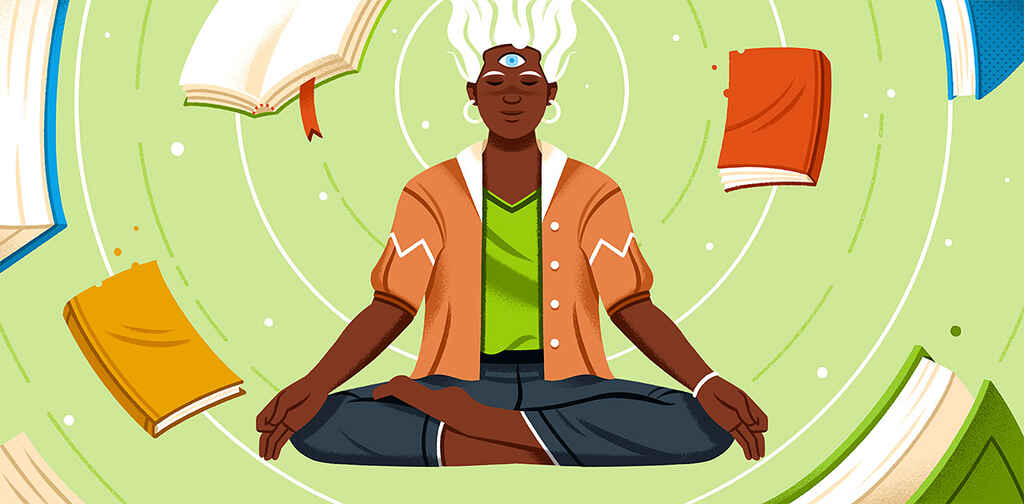
Make a list of favorite books and authors, then consider what you love about each of them. What do they have in common vs. how are they unique? Consider specific writing techniques you could implement in your own work, or themes that you find especially compelling.
Take The Great Gatsby, for example — are you drawn to the parties and glamor of 1920s New York? Perhaps you’re captivated by the extravagant, larger-than-life characters or the drama and intrigue throughout the story. Or maybe you love the literary embellishments of Nabokov — it might be tough at first, but you could try writing in a similarly elaborate style.
Work out what you look for in the books you read, whatever it might be, and incorporate that into your own work. (And the next time you find yourself wanting inspiration, well, that’s a perfect excuse to read even more!) Though, a word to the wise: if you feel like your problem is perfectionism rather than a lack of inspiration, this exercise may have the opposite effect!
3. Build a solid routine
Author and choreographer Twyla Tharp once wrote, “Creativity is a habit.” This might seem counterintuitive to some — isn’t creativity something that naturally ebbs and flows, not something you can schedule? But the truth is, if you only write when you “feel creative”, you’re bound to get stuck in a rut.
One of the best ways to push through a lack of motivation or manage a busy life is by writing on a regular schedule. You may already have a routine of sorts, but if you don’t, figure out the days and times that really work best for you — if you feel most productive in the mornings, it could be worth waking up half an hour earlier to squeeze in some writing. Or, if you prefer low-pressure writing sessions, you could try Sunday afternoons when you have no other commitments.
Whichever days and times you choose, be consistent. The only way to build a reliable routine is to stick to your chosen sessions! Give it at least 3-4 weeks, and you’ll start seeing real progress.

FREE COURSE
How to Build a Solid Writing Routine
In 10 days, learn to change your habits to support your writing.
4. Write it badly at first
Many writers suffer from perfectionism, which is especially debilitating during a first draft. Reedsy editor Lauren Hughes says:
“Blocks often occur because writers put a lot of pressure on themselves to sound ‘right’ the first time. A good way to loosen up and have fun again in a draft is to give yourself permission to write imperfectly.
Writers often spend hours looking for the perfect phrasing to illustrate a concept, or they get so stuck on outlining their novel that they get stuck when it’s actually time to write. You can avoid this fruitless (and block-engendering) endeavor by freewriting. Freewriting, as opposed to outlining, allows you to bypass the inner critic and get your ideas down without worrying about structure or perfection. You can always come back to edit later!
One effective freewriting technique that you can try is putting, “In other words…” whenever you feel like you didn’t express something the way you wanted to. Then, simply write what you’re thinking, whether it’s eloquent or not. You can refine it later by doing a CTRL+F search for “in other words.” This exercise removes the mental pressure to get it right in the first go.
Speaking of freewriting: if you’re truly paralyzed, you might consider the extreme solution of The Most Dangerous Writing App. Just set up a timed writing session, and freewrite! If you stop typing for more than a few seconds, all your text will disappear. Needless to say, this app lives up to its name — but if you’re desperate to stop overthinking everything you write, it’s sure to get the job done!
5. Find a different way into the story
To move beyond a block, Hughes also suggests trying to see your story from another perspective. “How might a minor character narrate the scene if they were witnessing it? A ‘fly on the wall’ or another inanimate object?” Altering your story’s point of view (even temporarily) is a great way to break out of mental constraints and gain new insight.
To see point of view in action, here's an in-depth look at what POV is, complete with various examples.
Alternatively, going deeper into the backstory of one of your main characters could give you a better understanding of their behavior — which will, in turn, drive your story forward. Ask yourself what would make your character satisfied with their life. What are their goals? What are they willing to risk to achieve them? Once you have the answers to these broader questions, you can look at them in any scenario and ask, “What is their goal in this particular situation? What action(s) will they take to pursue it?”
For example, if your protagonist’s main goal were to save up and move away, how would they react if their best friend asked for a loan? Or if they entered a new relationship right before they were due to leave?
Different personalities and goals lead to conflicts that drive your story — indeed, if a POV change or more backstory doesn’t fix your writer’s block, go ahead and dive straight into conflict! This leads to our next tip...
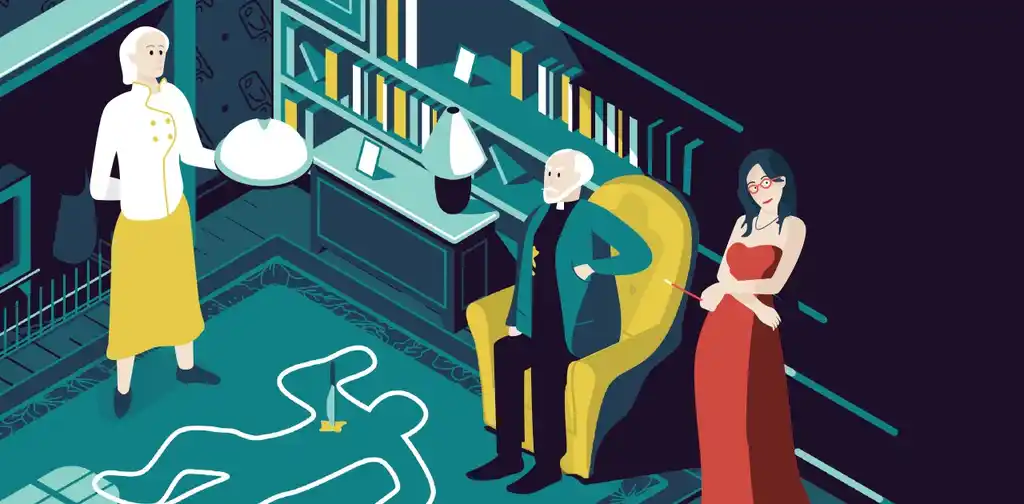
FREE COURSE
Understanding Point of View
Learn to master different POVs and choose the best for your story.
6. Start in the middle
There’s no hard-and-fast rule about starting at the beginning when writing a story — if you feel more excited about the middle, then start there! Or maybe you know exactly how you want your story to end and would prefer to work backward. Either way, you’ll feel less pressure to make a good impression with your first scene — and by the time you return to the beginning, you’ll be all warmed up!
If you haven’t already, you could also try mapping out your story in full to get a better idea of the bigger picture. Though improvising is fun, an outline will provide a much clearer picture of where your story’s heading and might give you a boost to keep writing! Not to mention that figuring out your story's trajectory can not only solve your current block but also prevent more blocks in the future.
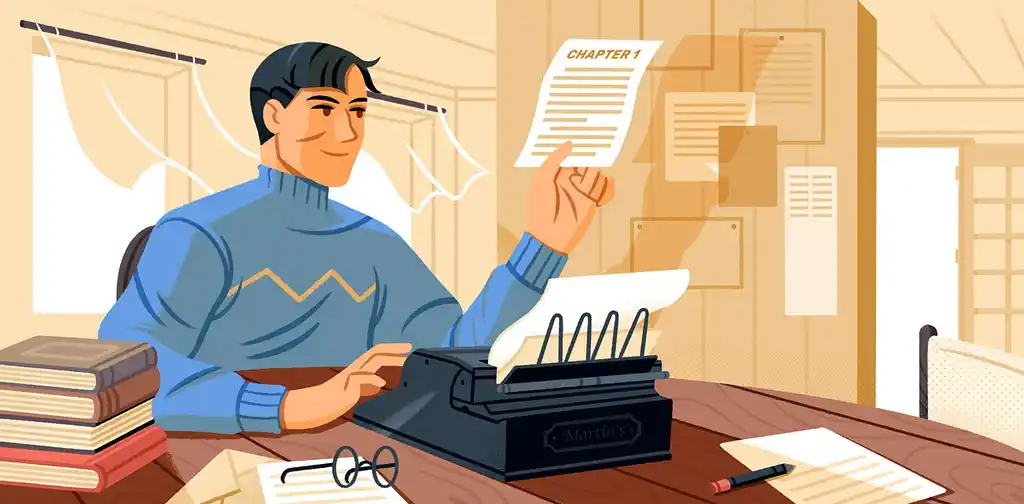
FREE RESOURCE
Get our Book Development Template
Use this template to go from a vague idea to a solid plan for a first draft.
As author Tom Evans says, when you start outlining, you’ll find that “the information you need to write that following chapter has an uncanny way of just showing up. Your brain tunes in to what you need to write... and the chapter just flows.” With this blueprint in hand, you’ll have a much easier time constructing your story.
7. Optimize your toolkit
 Just as switching to a different scene can help with writer’s block, so can upgrading your tools! Whether you’re struggling with a boring word processor, character development, or even coming up with something to write in the first place, there are plenty of tools out there to help:
Just as switching to a different scene can help with writer’s block, so can upgrading your tools! Whether you’re struggling with a boring word processor, character development, or even coming up with something to write in the first place, there are plenty of tools out there to help:
- Reedsy Studio is a free tool that formats your book for you as you write. It even has a built-in goal reminder system!
- The Plot Generator (try it here) with one million plot combinations is a great place to start if you’re stuck for inspiration.
- Or try the Character Name Generator (try it here) if you’re working on fleshing out some of your side characters.
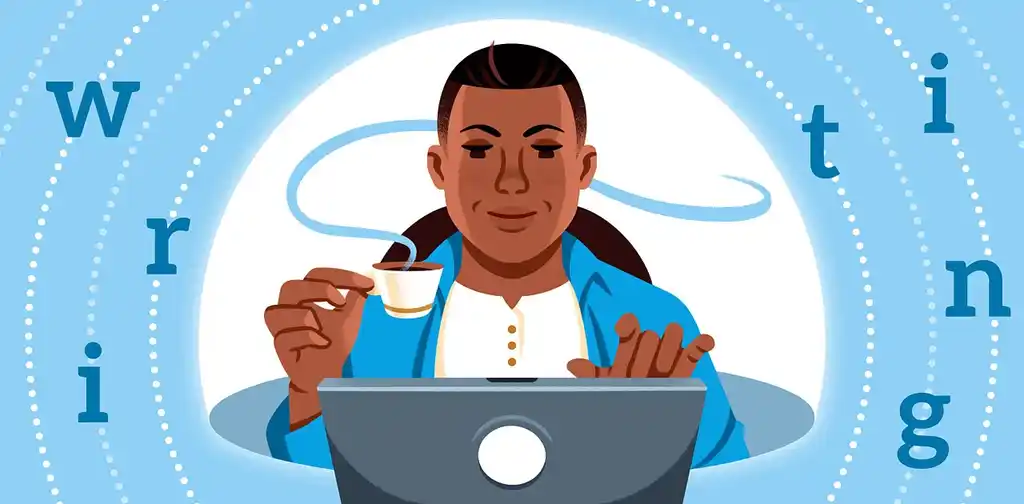
FREE WRITING APP
Reedsy Studio
Set goals, track progress, and establish your writing routine in our free app.
8. Write something else
Sometimes, it can help to take your mind off your current project and work on something else. Don’t worry — we’re not suggesting you ditch your novel and start a new one, but taking some time away to write something else could leave you feeling refreshed and even spark ideas for your other work!
Using the tools from our last tip, you could try writing the outline for a plot completely different from your main project, or fleshing out the backstory of a random character from the generator (use the questions from #5 to help you out!). If none of these take your fancy, check out Reedsy Prompts for over 1,000 short story prompts to help get your creative juices flowing!
Hire an expert
Kenneth Z.
Available to hire
What do you get when you combine an MFA, a decade of professional editing experience, and far too many wings and donuts? This guy.
Britny P.
Available to hire
Britny (she/they) is a YA fiction and pop culture non-fiction editor with over 7 years of traditional publishing experience.
Mike L.
Available to hire
20+ years in publishing. Ghostwritten 3 NYT bestsellers, edited/co-written/coached 50 Amazon #1s. Nonfiction, business, career, faith
9. Do something other than writing

After sitting at your desk for hours at a time, it can help massively to take a break and mentally “reset”, then start a new writing stint.
It may seem contradictory, but according to a study at the University of Oregon, rote tasks like doing the dishes, cleaning the house, and walking the dog allow your mind to wander, making it easier to come up with ideas and tap into your creativity. So, once your scheduled writing session is over, even if you didn’t get as much done as you would have liked, take a shower, go for a walk, or cook a nutritious meal in order to give your brain some space to work its silent magic.
Exercise can be particularly helpful, as other research shows that the release of endorphins and regular exercise allows for the growth of new cells in the hippocampus: the part of the brain that aids memory, idea generation, and imagining new situations.
Creativity breeds creativity
Feel like you need more time away? That’s no problem! Try and find other creative projects to inspire you. Children’s book editor Maria Tunney finds that one of the best ways to climb out of a writing funk is to take yourself out of your own work and into someone else’s:
“Go to an exhibition, to the cinema, to a play, a gig, eat a delicious meal — immerse yourself in great stuff and get your synapses crackling in a different way. Snippets of conversations, sounds, colors, sensations will creep into the space that once felt empty. Perhaps, then, you can return to your own desk with a new spark of intention.”
Remember, everyone needs to take a break from their work from time to time. Trying to force words onto a page when you’re burnt out will do more harm than good — and taking some time away could be just what you need to get the wheels turning again.
10. Stop believing in the myth of writer’s block
Writing is hard — there’s no doubt about it. After spending anywhere from weeks to years working on a project, you’re bound to feel frustrated if you reach a seemingly insurmountable roadblock. That said, there is always a root cause of the problem — and though it may take some time and dedication, there’ll be a way to solve it.
On top of all the tactics listed above, here are a few mantras to keep in mind as you attempt to tackle your writer’s block:
- “There is no permanent block, only temporary setbacks.”
- “It does not matter how slow you go so long as you do not stop.”
- “Every great writer has been here too.”
Hire a book coach to break through creative blocks
Kenneth Z.
Available to hire
What do you get when you combine an MFA, a decade of professional editing experience, and far too many wings and donuts? This guy.
Britny P.
Available to hire
Britny (she/they) is a YA fiction and pop culture non-fiction editor with over 7 years of traditional publishing experience.
Mike L.
Available to hire
20+ years in publishing. Ghostwritten 3 NYT bestsellers, edited/co-written/coached 50 Amazon #1s. Nonfiction, business, career, faith
There’s no magic trick or formula for overcoming writer’s block. But if you add these 10 tips to your creative arsenal, you’ll be well on your way to kicking it to the curb!





